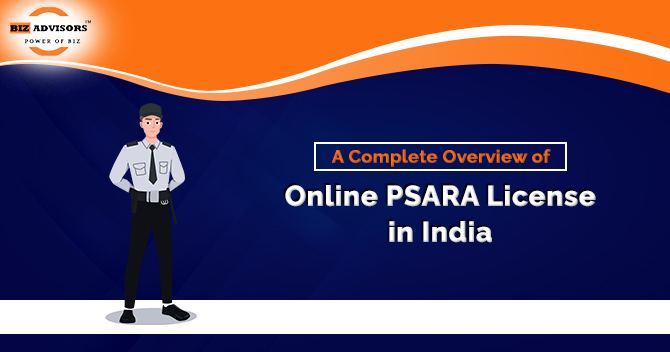The growing economic environment in India has raised demand for private protection. Every organization, from banks to elegant restaurants, car showrooms to cutting-edge factories, requires adequate security to keep criminal elements out or to ensure proper gate maintenance. The Private Security Agencies (Regulation) Act of 2005 was enacted in response to rising safety concerns (PSARA). The aforementioned Act grants India the authority to establish a legitimate private security firm. Furthermore, this Act governs all aspects of private security organizations in India, including gaining registration and recruiting staff for security services. In this blog , we’ll learn about Online PSARA License in India.
Understanding the legal structure governing private security agencies in India requires knowledge of the intent behind and relevance of the Private Security Agencies Regulation Act (PSARA) licence.
Purpose for a PSARA Licence
- Private security industry regulation: The regulation of the operations of private security firms operating in India is one of the main goals of the PSARA licence. It establishes the legal guidelines for the creation and management of these organisations.
- Maintaining Accountability: The PSARA licence guarantees that private security companies operate in a transparent and accountable manner. It specifies precise rules and requirements that agencies must follow, encouraging professionalism in the sector.
- Protecting Client Interests: The law intends to safeguard the rights of clients who engage private security companies to provide security services by requiring them to get licences. Clients can trust that licenced agencies have adhered to a set of operating and quality criteria.
- Protection of National Security: The PSARA license’s protection of national security interests is a crucial component. To stop the unauthorised use of private security resources or personnel, the government can exercise control and oversight.
- Training Standardisation: The PSARA licence frequently requires that security personnel complete particular training courses. This guarantees that security staff members have the necessary training to deal with a variety of security situations and emergencies.
Importance of Online PSARA Licence in India:
- Legal Compliance: Private security companies operating in India are required by law to get a PSARA licence. Operating without a current licence may result in sanctions and the closure of the business.
- Trust and Credibility: A private security company’s credibility and dependability are increased by holding a PSARA licence. When an agency has a valid licence, clients are more likely to hire them because they know that they have complied with all legal requirements.
- Quality Control: The PSARA licence certifies that the organisation has complied with strict operating and quality standards, including background checks on all of its employees. The quality guarantee raises the private security sector’s professionalism.
- Consumer protection: Customers gain from the PSARA licence since it offers a procedure for handling complaints and disagreements with licenced businesses. In the event of any problems, they can file a complaint with the regulatory authorities.
- Enhanced Security: To help ensure that security services are delivered by people with clean records and the necessary qualifications, the licencing procedure frequently includes security clearances and background checks for agency workers.
- Deterrent to Unlawful Activities: The PSARA licence serves as a deterrent against illegal activity in the private security sector because companies operating without a licence risk legal repercussion.
Types of PSARA Licence
Depending on the extent of their operations, private security agencies can apply for various sorts of licences under India’s Private Security Agencies Regulation Act (PSARA). These permits are made to meet the particular requirements and functions of various private security companies.
- Licence for Armed Guards: This kind of licence is given to private security companies that use armed guards. Guns may be carried by armed guards when they are on duty. Usually, high-value assets, sensitive places, or people who need a higher level of protection are the targets of these guards’ hiring.
- Unarmed Guard Licence: This kind of licence is obtained by private security companies who use unarmed security guards. Security services are provided by unarmed guards who do not have access to weapons. They are frequently used in places like apartment buildings and business buildings where a lower level of protection is necessary.
- Unarmed Guard Licence: This kind of licence is obtained by private security companies who use unarmed security guards. Security services are provided by unarmed guards who do not have access to weapons. They are frequently used in places like apartment buildings and business buildings where a lower level of protection is necessary.
- Cash-in-Transit (CIT) License: Private security companies that handle and transport cash must have a Cash-in-Transit (CIT) licence. Their ability to transmit money and valuables safely between establishments like banks, ATMs, and enterprises is made possible by this licence.
- Central Monitoring System (CMS) License: Some private security companies specialise in offering electronic surveillance and monitoring services, such as CCTV monitoring and alarm system monitoring. Central Monitoring System (CMS) Licence. These businesses can only function legally if they have a CMS licence.
- Event Security License: An event security licence is available to private security companies that specialise in offering security services for events including conferences, sporting events, concerts, and festivals. Crowd control, access management, and participant safety are frequently part of event security.
- Licence for Security consultant: Companies that provide advisory and consultant services for security risk assessment, security system design, and security planning are eligible for this type of licence. Security consultants assist businesses in locating and addressing security flaws.
- Private Detective Agency License: Licence for Private Detective services: Even though they are not always covered by PSARA, private detective services nonetheless need to acquire the required licences in order to conduct business legally. These organisations carry out inquiries into private, business, and legal concerns.
Amendment and Renewal of PSARA Licence
Private security agencies in India must go through significant procedures to renew and modify their PSARA (Private Security Agencies Regulation Act) licences in order to preserve their legal standing and change with the times.
Licence renewal for the PSARA:
- Timely Renewal: Prior to the expiration date, private security companies must apply to renew their PSARA licence. Ideally, renewal requests should be made far in advance—at least 30 to 60 days before the expiration date.
- Application Submission: In order to renew the licence, the agency must submit an application to the state’s regulatory body. The state’s official website or the neighbourhood PSARA office are often where one can receive the application form.
- Documentation: Updated documentation and information, such as the following, must be submitted by agencies with their renewal applications in most cases.
- Evidence of ongoing adherence to PSARA rules.
- The most recent financial statements.
- information on any modifications to the agency’s ownership or management.
- updated details, including background checks, on security staff.
- Evidence of any training or certificates that the staff may need.
- An affidavit[1] confirming that neither the agency nor its staff have engaged in any illegal activity.
- Renewal Fee: Private security companies must pay a renewal cost that has been set by the state government. The cost may differ from one state to another.
- Verification and Inspection: The supervising authority may carry out a verification and inspection procedure after receiving the renewal application to make sure the agency continues to adhere to the necessary regulations.
- Approval: The agency’s PSARA licence renewal will be approved if the controlling authority is pleased with the agency’s compliance and supporting paperwork.
- Extension of Validity: Upon renewal, the PSARA licence is extended for a predetermined amount of time, often one to three years, depending on the laws of the state.
Amendment of PSARA Licence
When the agency’s operations, mission, or structure change, a PSARA licence amendment is required. Typical justifications for changing a licence include:
- Change in Ownership: The controlling authority must be informed whenever the agency’s ownership or management changes. The licence might need to be amended to reflect the new information.
- Change of Address: According to state regulations, if the agency moves to a new address, it must inform the regulating authorities and update the licence to reflect the new address.
- Change in Services: If the agency plans to introduce new services (such CIT services) or stop providing some current services, the licence must be amended to reflect these changes.
- Change in Key Personnel: The governing authority should be informed of any changes to key personnel, such as directors or partners, as revisions may be necessary.
- Equipment Changes: The licence should be updated whenever the agency buys or sells security tools like guns or surveillance systems.
A PSARA licence amendment normally entails submitting an amendment application and supporting materials to the regulating body. If the agency’s request is granted, the controlling body will examine the application and update the licence as appropriate.
To ensure compliance with PSARA laws, private security agencies must be proactive in renewing their licences before they expire and amending them as soon as there are changes to their operations or organisational structure.
Conclusion
The introduction of the Online PSARA License in India marks a significant step towards modernization and efficiency in the private security sector. It not only eases the process for security agencies but also ensures a higher level of accountability and transparency. As private security services continue to play an essential role in safeguarding the nation, the Online PSARA License system is a welcome change that benefits both the industry and the public. With this digital leap, India is taking a giant stride towards a more secure and digitally empowered future.
Read our article:A Complete Overview of Private Security Agencies Regulation Act (PSARA)
 9559179325
9559179325 9559179325
9559179325




